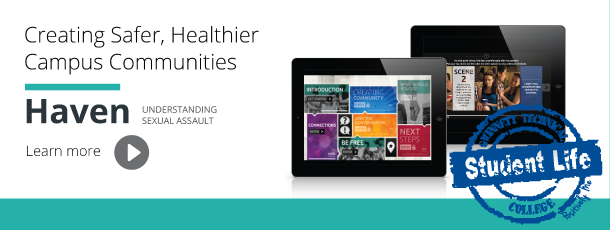The Higher Education Act of 1965 (HEA), as amended by the Higher Education Opportunity Act of 2008 (HEOA), includes many disclosure and reporting requirements that require colleges and universities to make available to current and prospective students regarding important information concerning the institution’s academic programs, retention rates, graduation rates, crime reports, financial aid procedures and much more in an effort to ensure fairness and transparency for all higher education consumers. Gwinnett Technical College has developed this page to serve as the central portal for obtaining necessary information about our institution and allow all students to access the information they need to make the best college decision possible for them.
Additionally, every August, Gwinnett Tech sends out a notice informing faculty, staff, and students that multiple regulatory notices will be sent, via email, periodically throughout the year, to ensure awareness of required information and resources.
While Gwinnett Tech does not require vaccinations or record of immunization for admissions, proof of certain vaccinations and immunization records are required after admission for some programs, such as early childhood education or healthcare programs, where students would be doing clinical externships in childcare or medical facilities.
The Gwinnett Technical College Policy on alcohol and other drugs is published online annually in the Gwinnett Tech Course Catalog under Student Information and on the Drug-Free Campus webpage. In accordance with the Drug Free Schools and Communities Act Amendments of 1989, Gwinnett Tech supports a program to prevent the use of illicit drugs and the abuse of alcohol by students and employees. College standards of conduct clearly prohibit the unlawful possession, use, or distribution of alcohol, marijuana, a controlled substance, or other illegal or dangerous drugs on campus or as part of any student sponsored activities. For additional information, contact Gwinnett Tech Police Department at 5150 Sugarloaf Parkway, Lawrenceville, Georgia 30043, 678-226-7377.
Placement
Placement at Gwinnett Technical College is calculated based on certain self-identified characteristics upon student graduation. In 2015, Gwinnett Tech graduates had an overall 76% for in-field (i.e., a job related to the major) job placement rate and a 99% overall placement (i.e., In Field + Military + Related Field+ Unrelated Field + In Field and Cont. Ed + Related Field and Cont. Ed + Unrelated Field and Cont. Ed + Cont. Ed / Numerator + Not Employed) rate.
Employers of Recent Gwinnett Tech Graduates
Over the years, Gwinnett Tech graduates have benefited from their education by finding rewarding jobs. Here is a sample of companies with whom Gwinnett Tech graduates have found employment:
- Student Records-FERPA
- Withdrawal Policy and Procedure
- Institutional Information
- Student Accommodations
- Copyright Infringement
- Transfer Credit Policy
- Drug Violations and Consequences
- Constitution Day
- Location – Student Life Center
- Date – September 18, 2024
- Time – See Student Newsletter and Blackboard announcements for details
- Description – Celebrate the ratification of the US Constitution with Student Life! We will have patriotic giveaways for those who attend. The aim of Constitution Day is to help students understand the importance of the Constitution and the freedoms it protects. Students will also have the opportunity to register to vote!
- Voter Registration
- Drug and Alcohol Prevention
- Graduation Rate
- Retention Rate
- Placement Rate
- Annual Fire Safety and Security Report
- Information Security
- Programs of Study
- Faculty and Staff Directory
- Strategic Planning
- Tuition and Fees
- Student Activities
- Textbook Information
- Code of Conduct
Gwinnett Technical College has historically provided educational access to a diverse population of students in its service delivery area (SDA). Generally, most of the College’s AY23 students (89%) took part-time course loads (e.g., less than 12 credit hours). While most Gwinnett Tech students are female (59%), between 21 and 25 (28%) and under 21 ((36%), the classrooms are filled with students from a range of ethnicities and age groups, factors that enhance the learning environment.
|
Graduation Rates by Financial Aid Recipient Types |
|
|---|---|
| Pell Recipients Only | 82.8% |
| Federal Direct Loan recipients (excluding Federal Direct Unsubsidized Stafford Loan) who did not receive a Federal Pell Grant | 86.1% |
| Recipients of neither a Federal Pell Grant nor a Federal Direct Loan (other than a Federal Direct Unsubsidized Stafford Loan) | 92.5% |
Source: TCSG KMS #TEC3111 (Graduate Rates); #TEC0344 (IPEDS Student Financial Aid Detail Report)
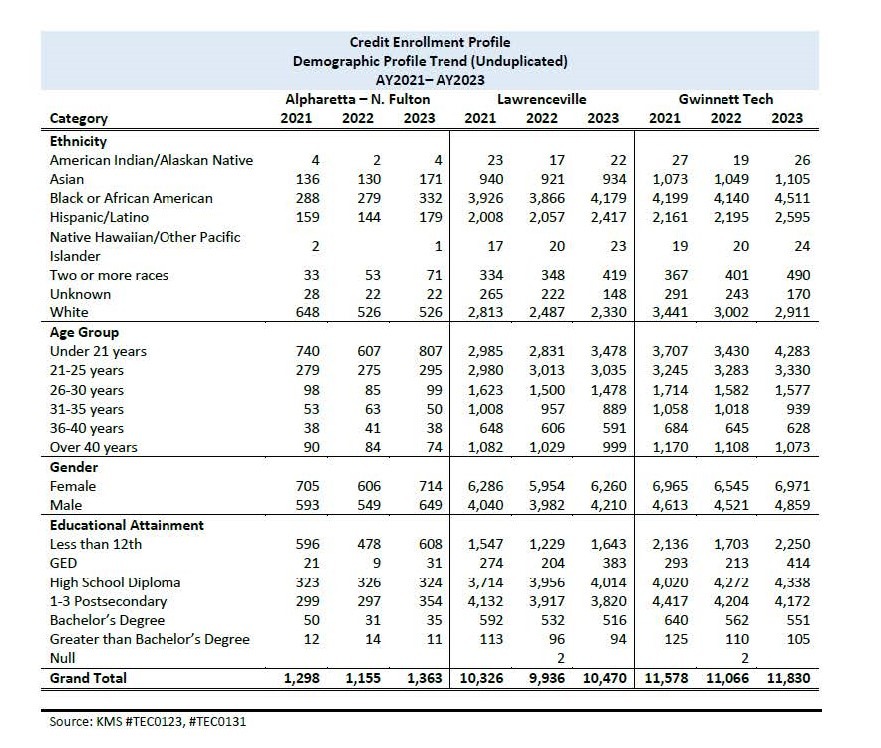
Graduation Rate and Transfer-Out Rate
Federal regulations specify how to calculate the graduation and transfer rates. The rates represent students who started college in the fall of 2018. The study includes all full-time, first-time fall enrollees seeking to earn a degree, diploma, or certificate at the College. The graduation rate is the percentage of students who graduated from Gwinnett Technical College within three years. The transfer-out rate is the percentage of students who did not graduate from Gwinnett Technical College, but instead transferred to another college or university within three years. These rates do not report on all students at Gwinnett Technical College. The graduation rate that IPEDS calculates is only reflective of the 2018 cohort of full-time, first-time degree or certificate-seeking students who complete their program within 150% of the normal completion time. On average, one-third of the college’s students are full-time, and the majority are part-time.
Graduation and transfer-out rates of full-time, first-time degree/certificate-seeking undergraduate students within 150% of normal time to program completion, by race/ethnicity: 2019 cohort.
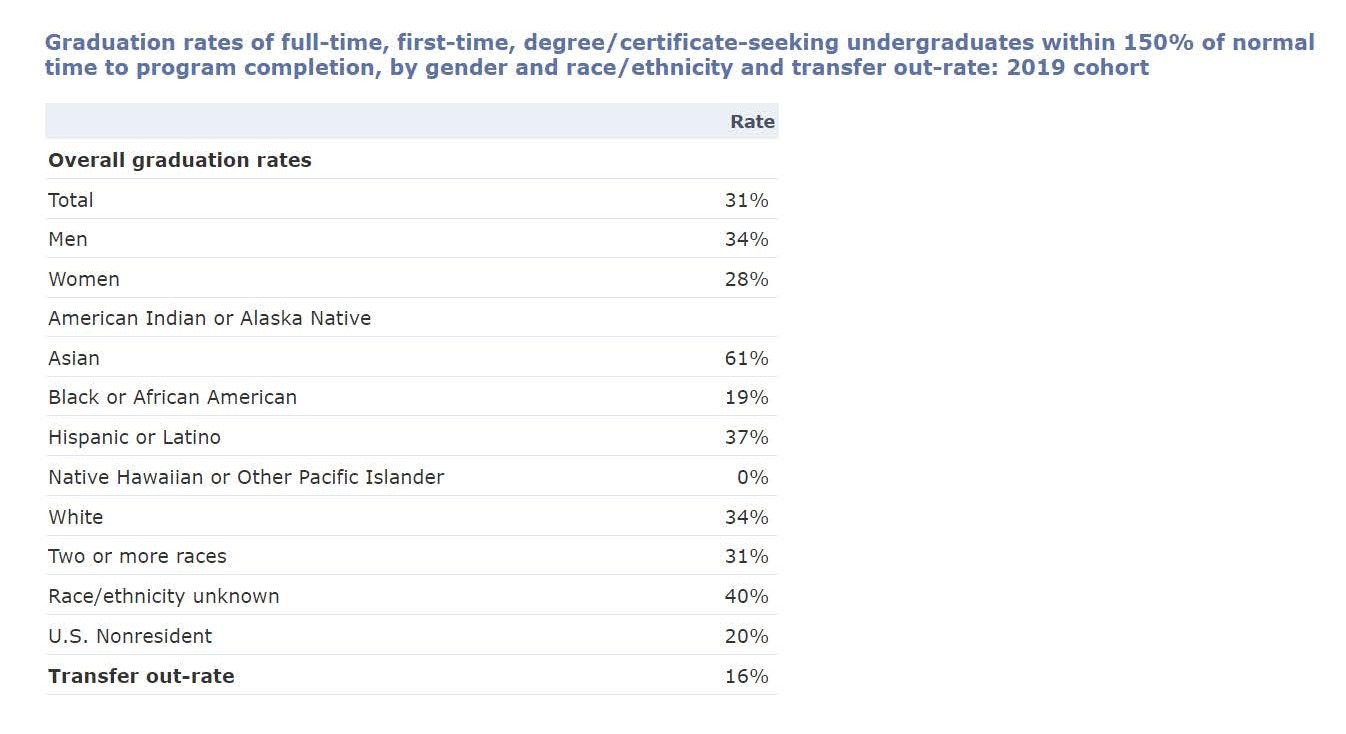
The TCSG (Technical College System of Georgia) graduation rate is based on all full-time and part-time students enrolled in an award program (Technical Certificate of Credit, Diploma, or Degree) and in at least one vocation course who left the College as a graduate or non-graduate leaver (all leavers) during a two-year period (the year shown and the previous year).
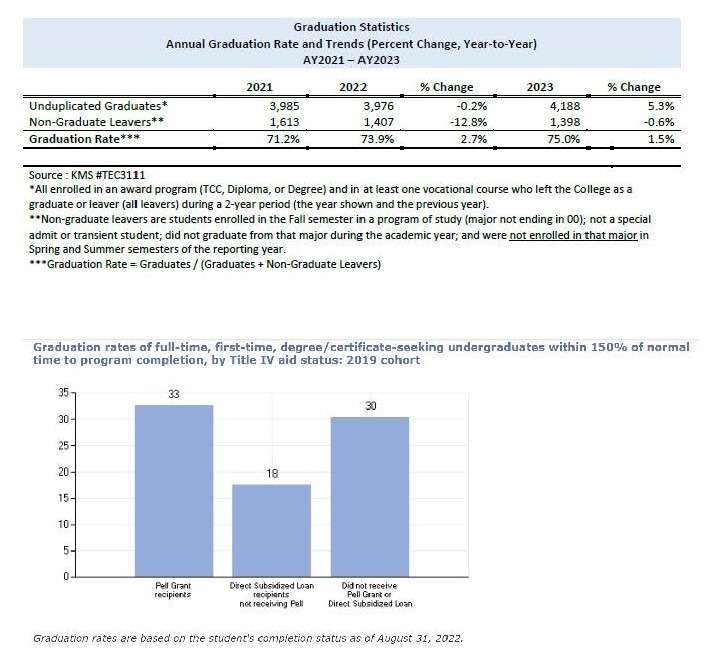
Retention since FY2009, the College has maintained a retention rate in the mid-to-high-60% range.
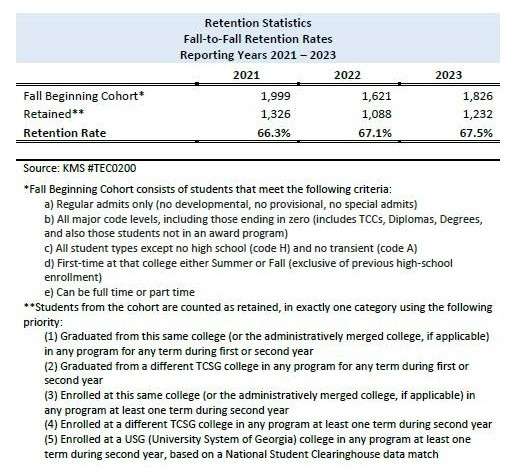
*Fall-to-fall retention tracks a fall cohort (first-time, regular admitted students) from a previous academic year who graduated or were still enrolled at a Georgia Technical College or university system college as of the fall semester in the subsequent year shown.
Student Records
Notification of Rights under Family Educational Rights and Privacy Act (FERPA) Access: Annually, Gwinnett Tech informs students of the Family Educational Rights and Privacy Act of 1974 (FERPA). The college is committed to ensuring the privacy and personal information of all students, including those enrolled in distance education/online learning courses and programs. The college’s learning management system (Blackboard) and online grade submissions are password protected; neither violates FERPA. Online instructors are required to respect students’ privacy rights regarding their educational records. Student educational records are maintained and disclosed according to the guidelines of this policy. This Act, with which the institution fully complies, was designed to protect the privacy of education records, to establish the right of students to inspect and review their education records, and to provide guidelines for the correction of inaccurate or misleading data through informal and formal hearings. Educational records include any records (in handwriting and in print, on tape, film, computer, or other media) maintained by Gwinnett Tech that are directly related to a student as specifically outlined in the federal guidelines and in this catalog. Under FERPA, TSCG and its technical colleges must provide an eligible student with an opportunity to inspect and review his or her education records within 45 days following its receipt of a request. Students have the right to file complaints with the Family Policy Compliance Office, U.S. Department of Education, 400 Maryland Avenue, SW, Washington, DC 20202-4605, concerning alleged failures by the institution to comply with the Act.
The Family Educational Rights and Privacy Act (“FERPA”), a Federal law, requires that TCSG and its technical colleges, with certain exceptions, obtain a student’s written consent prior to the disclosure of personally identifiable information from that student’s education records. However, TCSG or its technical colleges may disclose appropriately designated “directory information” without written consent unless the student has advised TCSG or the technical college to the contrary. Directory information, which is information that is generally not considered harmful or an invasion of privacy if released, can also be disclosed to outside organizations without the student’s prior written consent.
If a student does not want TCSG or the technical college to disclose directory information from his or her student education records without prior written consent, the student must notify TCSG or the technical college where he or she is enrolled in writing by the first day of the semester at the Registrar’s Office at his or her technical college. A student needs only to file this notification once during his or her enrollment. However, if there is a break in enrollment or transfer to another TCSG technical college, a new notification must be filed. Even if a student elects to prohibit the release of directory information, TCSG or the technical college may still implement policies requiring the student to wear or present a student ID badge. The Technical College System of Georgia and its technical colleges define “directory information” as follows full name of student, City of residence, County of residence, major and field(s) of study, degrees and awards including nature and date received, dates of attendance, school or division of enrollment, enrollment status (i.e., full or part-time, undergraduate, graduate), name of institution last attended, participation in official sports and activities, height and weight of athletic team members, photograph(s). No information (excluding directory information) will be released to a third party without the written consent of the individual or as directed by law. Additionally, certain state and federal laws require the release of certain student information without prior notification to the student.
The Technical College System of Georgia and its technical colleges define “non-public directory information” as follows:
Address
Email address
Telephone Number
Non-public directory information is not available to the public, but is available to any college official. If the student has indicated to restrict their data, then college officials can only access the information when it is needed for educational purposes.
Institutional policy explains in detail the procedures to be used for compliance with the provisions of the Act. Copies of the Statement of Policy: Access to student records are available in the Registrar’s Office. Gwinnett Tech guarantees students, regardless of dates of attendance, the right to inspect and review all official records created during their period of enrollment at the college. Any requests for a record review shall be presented in writing to the registrar. The registrar will complete a file review within a reasonable time frame as set by federal regulations. Any review of records will be conducted on college premises, and no material may be copied or removed from the file.
Academic records for students are maintained by the Registrar’s Office and include acceptance letters, entrance exam reports, admission applications, transcripts from other postsecondary institutions, high school transcripts, GED transcripts, relevant correspondence, transfer credit evaluations, graduation applications, graduation evaluations, and Gwinnett Tech transcripts.
Students who wish to allow parents or other third parties to have access to their confidential records and information must complete a “Consent to Disclose Information” form in the Enrollment Support Center. This form specifies what information may be released and to whom it may be released. Valid government-issued photo identification is required of all parties upon submission of the form. All parties are required to be present upon submission of the form.
Student records relating to disabilities and special services are maintained by the ADA/ Section 504 coordinator. These records are confidential and are not released to any faculty or staff member without expressed permission from the student. These records are kept separately from academic files and are not used in determining admissibility for any program, club, or service provided by Gwinnett Tech.
Required Annual Notification to Students of Their Rights under FERPA Students are hereby notified through publication of this catalog, also available online on the college website at www.GwinnettTech.edu, that they have rights under FERPA including: right to inspect and review education records; right to request amendment of education records; Right to consent to disclosures, with certain exceptions; and right to file a complaint with U.S. Department of Education. Students requesting a review of education records must send a written request to the registrar of the college. The registrar will respond within the timeline and in the manner required by law. Students should be advised that education records may be disclosed to school officials including full-time administrators and academic program with legitimate educational interest, for making decisions regarding student placement, program acceptance and completion or for the generation of required state and federal reports.
Retention of Records
Gwinnett Tech follows the guidelines set by the American Association of Collegiate Registrars and Admissions Officers as published in Retention of Records. The Registrar’s Office permanently retains Gwinnett Tech academic records (grades) for all credit students. Documents of students maintained for a minimum of five years after the last date of attendance include: applications, acceptance letters, test scores, transcripts from other schools, program changes, applications for graduation, graduation authorizations, and transfer credit evaluations.
Release of Directory Information
Students are advised that no education records will be released to anyone (except certain organizations stipulated by FERPA regulation) without the written consent of the student. In addition, under terms of the Act, the college classifies certain items of a student’s records as “directory information.” These items of information may be released to any third party at the discretion of the college.
Student directory information is defined as the student’s name, date of birth, City of residence, County of residence, program of study, dates of attendance, status as full- or part-time, and degrees, diplomas, certificates, and awards applied for and/or received. To suppress the release of directory information, students must complete a Request to Prevent Disclosure of Directory Information available in the Enrollment Support Center or on the Gwinnett Tech Banner page.
The Technical College System of Georgia and its technical colleges define “non-public directory information” as follows:
Address
Email address
Telephone Number
Non-public directory information is not available to the public, but is available to any college official. If the student has indicated to restrict their data, then college officials can only access the information when it is needed for educational purposes.
Solomon Amendment
The Solomon Amendment requires Gwinnett Tech to release directory information to the military for recruitment purposes. The scope of information that Gwinnett Tech is required to produce under the Solomon Amendment is broader in scope than the student information traditionally released by schools as “directory information” under FERPA. Gwinnett Tech functions in compliance with the regulations of the Solomon Amendment. To suppress the release of information, students must complete a Request to Prevent Disclosure of Directory Information available in the Enrollment Support Center or on the
Students are advised that no education records will be released to anyone (except certain organizations stipulated by FERPA regulation) without the written consent of the student. In addition, under terms of the Act, the college classifies certain items of a student’s records as “directory information.” These items of information may be released to any third party at the discretion of the college.
Student directory information is defined as the student’s name, date of birth, City of residence, County of residence, program of study, dates of attendance, status as full- or part-time, and degrees, diplomas, certificates, and awards applied for and/or received. To suppress the release of directory information, students must complete a Request to Prevent Disclosure of Directory Information available in the Enrollment Support Center or on the Gwinnett Tech Banner page.
Change in Address
Students with changes in address, or phone numbers should complete a student change form. Students must present photo identification in the Enrollment Support Center or use secure student email. Requests must include student ID numbers and be emailed to registrarsoffice@ GwinnettTech.edu.
Change in Name
Students with changes in name should complete a student change form. Students must present to the Enrollment Support Center photo identification with legal verification of change and one of the following, i.e. social security card, marriage license, divorce decree. Only original documents will be accepted.
Gwinnett Technical College Police Officers provide security for all Gwinnett Technical College campuses during normal operating hours. Police officers are responsible for a full range of public safety services including all crime reports, investigations, and traffic control/accident reports; enforcement of laws concerning use of alcoholic beverages, controlled substances and weapons on campus; and all other incidents requiring police assistance or emergency medical care.
Federal regulations require colleges to disclose information regarding their occupational programs that require a state licensure to be employed, and the status of the program for meeting an individual state’s licensure requirements. To determine if a program meets state licensure requirements, locate the program of choice, and view the status that program has for the state you are located. If the state you are located in does not appear in the meets program licensure requirements field, then we cannot guarantee the program of study will be able to lead you to a state occupational licensure in your state.

